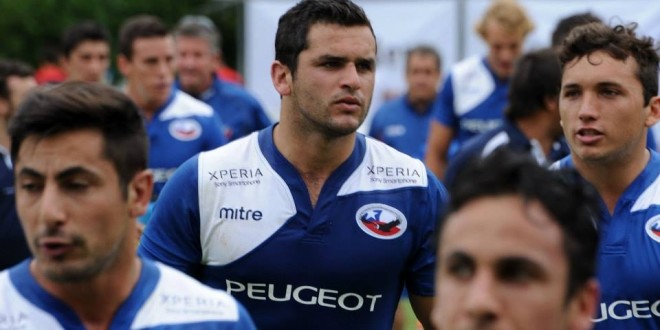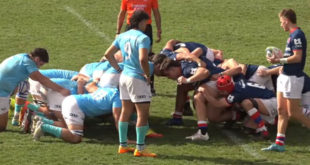Chile is one of the fastest rising countries in world rugby, and especially the Americas. This week Americas Rugby News had a unique chance to peek inside Chilean rugby with international flyhalf Francisco González Moller.
How did you begin playing rugby?
I started playing rugby when i was 15 years old. I started playing at St. Edmund’s College in Canberra, Australia. The whole family traveled around because of my dads work, he was in the navy so we went over for two years. I always wanted to play rugby but my mom didn’t like it so much because of all the injuries that my dad used to have (he played as an inside centre for Sporting rugby, Chile). So when we were in Australia she had no chance and the whole family started playing again.
How do you view Chilean rugby both at the junior and senior levels?
Rugby in Chile is growing but there are too many organizational problems, we need to create consciousness and get the right people at the highest level of the federation and they should start working with the players, trying to make the sport grow and hopefully one day we can be professional.
At the Junior level it is pretty much under 19, I personally played in two under 20 World Cups (Dubai 2006 and Belfast 2007) and a JWRT (Chile 2008) and honestly the difference is not as big as it is at adult level and that’s why we need to put in more work at the junior levels.
You train hard, sacrifice a lot of things but have nothing in return, not even international matches or tours, nothing. And that keeps happening at adult level and there is no way you are going to improve playing that many games.
Rugby in Chile is physical and all the players are trained and prepared but do not have enough about how to play rugby. It is funny, but it is the reality. I personally played two seasons for Sumner rugby in Christchurch, New Zealand and there are a lot of Division 1 players that could play in New Zealand, but we need motivation and players need to start playing overseas.
In your opinion what is the importance of Los Pumas and Argentine rugby in general for Chilean rugby?
Everything that happens to Argentina has a direct relation to Chile, starting from the games, players, coaches, etc. Because we are so close to each other we have received a lot of help from them, and the relationship that we have with them helps us, we have friendly matches, coaching courses, physio clinics. With them doing so well and putting a good name on the South American countries i reckon it’s good for us.
Chile faces Mexico, Uruguay and the USA in Pool play at the Pan American Games. What is the team’s objective?
The games are pretty hard, there are no easy games, all the teams seem very prepared to play in the Pan American games. The objectives of the teams are going from one match to the next, playing our game and staying focused. Hopefully we can go through and go back home with a medal.
How has Chile’s preparation been for Toronto?
Chile’s preparation ended up being pretty good. The coaches and the team work pretty hard with what we had – poor support from administration in terms of competition, players support (travel to training, having somewhere to stay when the players from regions had to go to the capital for training and camps, training equipment, gear, etc) but we ended up playing three South American tournaments that helped us to improve and to keep getting better.
We got to know the new coach and all the things that he wanted to implement on the team, went on a tour to Benidorm for ten days in Spain, the tournament is not of that high of a level but we had a good game in the final against Russia. After that the Olympics qualification in Santa Fé provided us with a couple of good games that defined the team and gave us time on the field to play our game.
Now its time to play, have fun and work hard towards the objectives. Hopefully we can go back home with a medal and keep working hard to make the Sevens team professional. Going back with a medal will mean getting the attention of sponsors and that’s what we need.
Looking further ahead to the proposed Americas Six Nations. How important is Chile’s inclusion to the future of rugby in the country?
The Americas Six Nations is probably the only thing going around Chile in terms of rugby development and competition at a high level. That’s been the main problem for the progress of Chile, not enough test matches, no tours, no competition and what that means is that, if there are no games there is no training. Hopefully it has been changing now that we have a new head coach that comes from a different culture in every perspective, hes got a rugby culture.
How do you and other players feel about the opportunity?
Having an Americas Six Nations is not only going to push players abilities and capacities that has to come with an administration development as well and that’s even a bigger problem now in Chile.
The coaches are professional, the players are amateur but they do everything in their power to look, play, think and live like a pro but looking at the administration it is amateur and the way they work is below that, so hopefully that changes in the future and the only thing we need is people who keep in their minds the importance of the development of rugby for the country not for a particular club from their regions. They have to know that the players are the most important thing and we have to work together to make things better.
Francisco González Moller is an international rugby player for Chile in both Rugby Sevens and at senior level. He made his international debut against Spain in Santiago in November 2013. He is 27 years old and plays flyhalf. Follow Francisco on twitter at @chopangonzalez
 Americas Rugby News Rugby news from across the Americas!
Americas Rugby News Rugby news from across the Americas!




